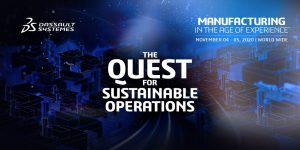This blog is written by Kevin Prouty, Group Vice President, Energy and Manufacturing Insights at IDC. Prouty is a speaker during our virtual event, Manufacturing in the Age of Experience: The Quest for Sustainable Operations, November 4-5.
IDC’s research has shown that sustainability in manufacturing is either driven from top-level executives or from grassroot employee initiatives. When driven from senior levels of the company, the goals are typically brand-oriented or compliance-driven. When driven by grassroots initiatives, sustainability goals tend to be local and very narrowly focused on one or two popularized aspects of sustainability.
What is missing from this picture is the role of middle management. Middle management comprises roles like plant manager, engineering manager, line supervisor, director of quality, etc. These roles have direct operational goals to meet. They are concerned about metrics like productivity, scrap rates, yields, and inventory. They are sometimes also given KPIs around safety, health, or environmental incident rates. But these are typically tactical and less of a priority in the list of metrics these roles are measured by. And remember, bonuses and other merit increases are based on these goals and metrics.
Middle management performs two key functions for the manufacturing organization. First, they ingest large amounts of data from the point of activity. They aggregate that data, provide their input, summarize it, then pass it up to the next level of middle management. Each level of middle management performs that same function on the data they receive from the level below them. By the time senior management gets the information its weeks or months old and has had several different biases applied to it. The second key function is in reverse. Taking decisions from senior management and moving them through various levels to execution at the point of activity, again, having several levels of bias applied. If incentives are not aligned with senior executive sustainability goals, very little sustainability progress will be made.
If you are serious about driving sustainability into an organization’s culture and operations, senior executives must be aggressive in either engaging middle management with new sustainability-focused incentives and goals or restructure middle management decision-making. Even if incentives are changed, much more transparency must be available to monitor decision-making within middle management.
And that transparency is a critical aspect that IDC has seen in its research on digital transformation and sustainability is that companies that are more digitally mature and invest in sustainability tend to have much higher sustainability rankings in the Dow Jones Sustainability index (DJSI) and have higher profits. And they go well beyond just changing the incentive plan of middle management. The digitally focused companies invest in digitally enhanced operational organizations where operational performance data is ingested, contextualized, and embedded in a resilient decision-making framework. The framework provides transparency, insight, and guidance to senior management on all operational issues, including sustainability.
IDC calls these digitally enhanced operational organizations Digital Engineering. This group’s main responsibility is to maintain the data architecture and the decision-making framework. This includes maintaining the data ingestion engine, analytical models, AI models, and digital twin applications for operations. In the end, Digital Engineering is the transformed middle management. The key to sustainable sustainability is the transformation of middle management to digital engineering.
 Learn more about Manufacturing in the Age of Experience: The Quest for Sustainable Operations, November 4-5.
Learn more about Manufacturing in the Age of Experience: The Quest for Sustainable Operations, November 4-5.
 Kevin Prouty is Group Vice President for IDC Energy and Manufacturing Insights. He is responsible for managing a group of analysts that provide research-based advisory and consulting services that will enable energy executives in oil and gas and utilities to maximize the business value of their technology investments and minimize technology risk through accurate planning. Kevin’s research specialties are Utilities, Manufacturing, Enterprise Applications, and Product Innovation research.
Kevin Prouty is Group Vice President for IDC Energy and Manufacturing Insights. He is responsible for managing a group of analysts that provide research-based advisory and consulting services that will enable energy executives in oil and gas and utilities to maximize the business value of their technology investments and minimize technology risk through accurate planning. Kevin’s research specialties are Utilities, Manufacturing, Enterprise Applications, and Product Innovation research.


